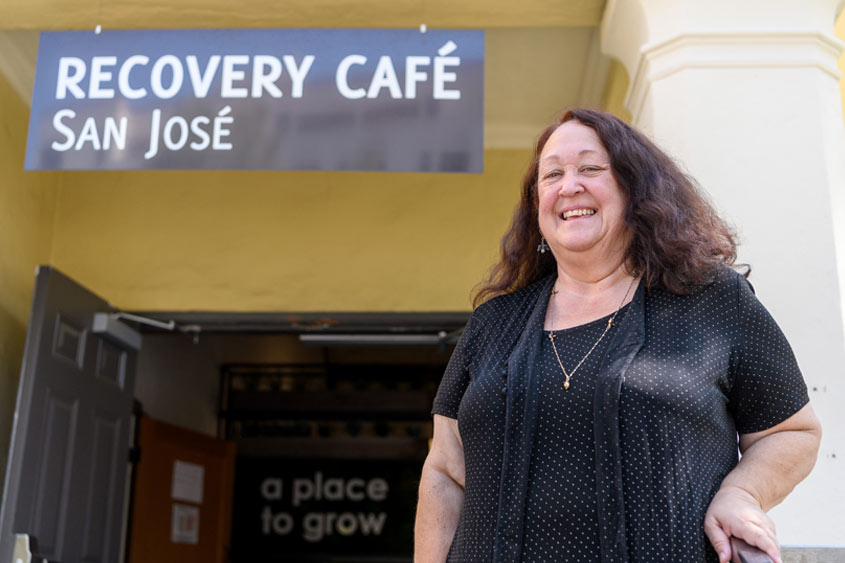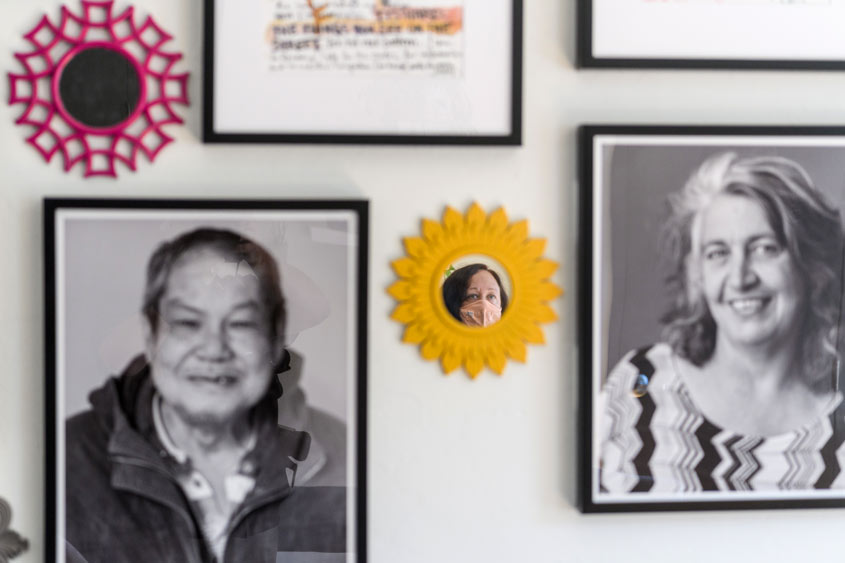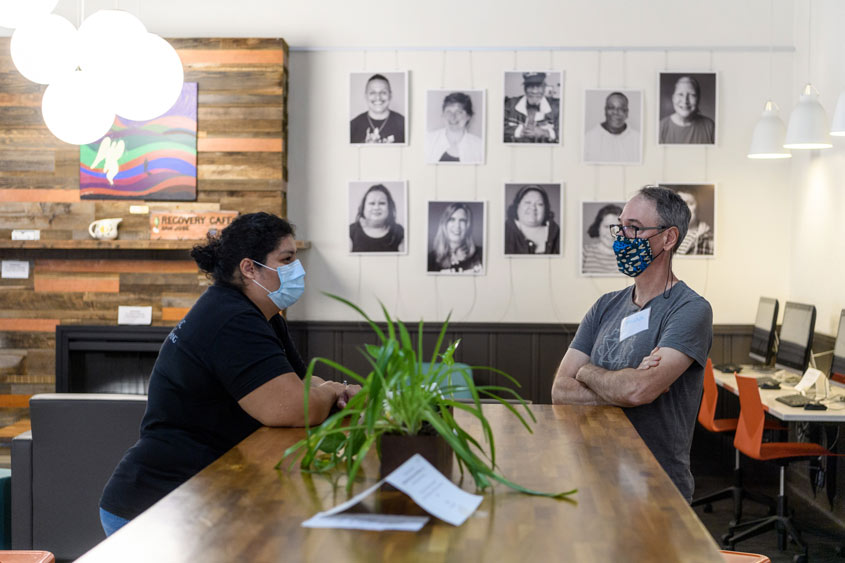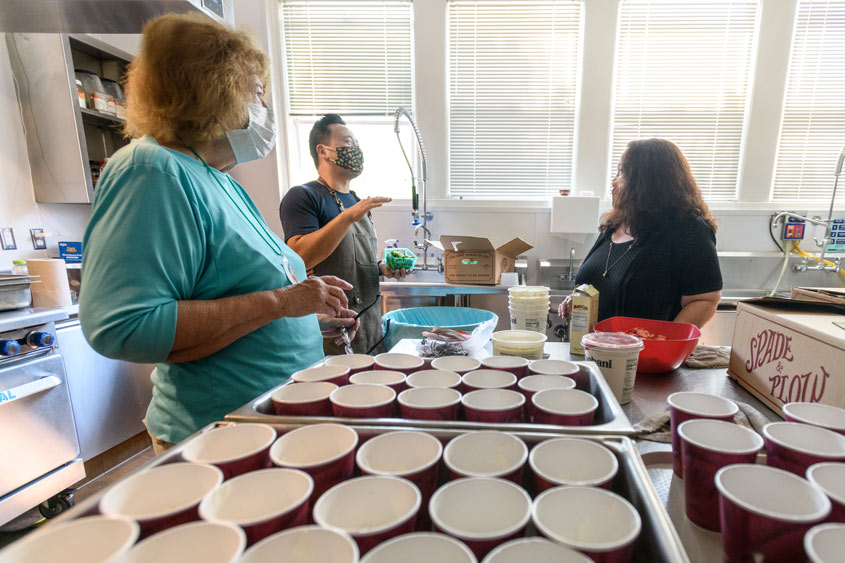The Metamorphosis of Recovery
By Julia Halprin Jackson

Kathy Córdova stands outside Recovery Café in San José. Photo by Robert Bain.
Kathy Córdova’s office is decorated with images of butterflies. As the executive director of Recovery Café San José, a nonprofit healing center for those traumatized by addiction, homelessness and mental health challenges, she sees the power of transformation every day.
“The process of watching a caterpillar move through a chrysalis and become a butterfly is very similar to recovery,” says Córdova, ’85 Social Science.
“Something beautiful can come out of darkness. That reminds me of my own story, which connects everyone from Tower Hall to those living in the streets. That connectedness makes us responsible for each other. We can learn and grow from each other.”
Her metamorphosis started more than 30 years ago, not long after she completed her tenure as student body president of San José State. A champion of the Progressive Student Party, Córdova worked hard to unite the social, academic and extracurricular circles across campus, from the Movimiento Estudiantil Chicanx de Aztlán (MeCHA) and the LGBTQ+ community to Greek life and the university president.
These opportunities offered hands-on experience with community building and budgeting, strategic planning and professional communications — and frequent access to alcohol.
“Serving as student body president was a great opportunity to experience the full spectrum of people,” she says. “And one of the unifying factors among these groups was alcohol.”
Alcohol became an easy outlet, even when she took a hiatus from school to work for community-focused nonprofits and local governments. Not long after she graduated from SJSU, she found the resources she needed to get sober.
“There was no Recovery Café when I got clean and sober in 1987,” she recalls. “Whereas today, there are many paths to recovery: non-secular, spiritual, medical, science-based and others; the options were much more limited 33 years ago. I connected through a triad of 12-step programs — Alcoholics Anonymous, Al-Anon and Narcotics Anonymous. The recovering people in those rooms loved me until I could love myself and helped to heal my brokenness.”
Recovery during a pandemic

Córdova admires portraits of Recovery Café members. Photo by Robert Bain.
Throughout her career as a nonprofit leader for organizations such as the Santa Maria Urban Ministry, Asian Americans for Community Involvement, West Valley Community Services, Somos Mayfair and Sacred Heart Nativity Schools, she recognized a universal truth: Everyone is recovering from something.
“There are different kinds of trauma in life,” she says. “Some people have experienced racialized trauma, others have substance abuse issues, some people have mental health challenges, others are coming from domestic violence situations. All of us are overcoming some sort of trauma, but transformation is possible.”
Córdova kept this in mind when she spotted an opportunity to lead the Recovery Café, which offers classes, community, coffee and free hot meals to anyone seeking help. Two months after she was hired, the COVID-19 pandemic forced her to close the cafe’s doors. She recognized a deadly issue for those struggling with addiction, domestic abuse and homelessness: social isolation.
“One Bay Area study cited a 42% increase in the amount of alcohol consumed during the early months of the pandemic, which means that people were suffering,” she says. “Not only that, they were suffering alone and at home. It has been really important to reestablish connections with our community.”
|
|
Though members could not visit the cafe in person from March 2020 until June 2021, the healing community remained intact. Córdova restructured their food program so members could pick up boxed meals. Volunteers also dropped off fresh food at homeless encampments. Recovery support meetings transitioned online so members could gather regularly, share stories and remain committed to their mental and physical well-being.
When the Café got cleared to safely re-open in summer 2021, Córdova says that members returned, seeking fellowship, on day one.
“When we reopened, one of our members came up to me in tears, having heard about the potential threat of the Delta variant,” she says. “She was really afraid that we’re going to have to shut down again. She said, ‘I know I will not survive if I can’t come to a place like this.’ The Recovery Café is a life raft.”
Addressing systemic inequities
The pandemic offered Córdova the chance to focus on expanding the Recovery Café model across the state. Modeled after the original Recovery Café in Seattle, the San José location was the only California branch until this past year. Thanks in part to her efforts, there are now Recovery Cafés filing for nonprofit status in Gilroy, Santa Cruz and San Francisco, with plans for additional branches in Hayward, Oakland and Orange County.

Recovery Café members can choose from classes, activities and skill-building workshops
at the downtown location. Photo by Robert Bain.
While Córdova sees growth as an essential next step for the Recovery Café, the push to expand was fueled in part by the national dialogue about police reform sparked by the 2020 murder of George Floyd. By offering free mental health and recovery services, places like Recovery Café can address community needs that are otherwise delegated directly to the police.
“A lot of our referrals have come out of the criminal justice system, both from Santa Clara County’s reentry program and from the county’s collaborative courts program, which works with therapeutic and restorative justice,” she says. “All the people that the cafes serve have experienced some kind of trauma and often racism or racist acts have exacerbated that trauma. That’s why we are hoping to provide more training for our staff and volunteers.”
As a member of the Silicon Valley Council for Nonprofits, Córdova has been involved in their efforts to address racial equity.
“We’re advocating at both the city and county level for redistributing funds, so there are non-police responses to behavioral health crises,” she adds. “As a network, we’ve been brainstorming ways to use our platforms to address systemic racism and how it impacts trauma.”
These ongoing initiatives reflect the cafe’s mission to be as inclusive and restorative as possible, Córdova says. While membership is free to the public, members are expected to find ways to give back. That can mean accessing barista training at the cafe to serve others coffee and meals, helping with janitorial needs, leading recovery circles or proposing skill-building workshops.
There is perhaps no greater symbol of the cafe’s enduring impact than the certificates members receive upon completion of eight-week classes and training. The certificates are especially meaningful for members who have never earned a diploma, she says.
“We are a healing community, not only for those who show up as members but for our volunteers and staff,” she says. “There are a lot of things in the world today that have made things difficult for individuals, and even for us globally, but I still believe that people can transform their lives.”
Learn more about the Recovery Café San José.
 Córdova and a Recovery Café volunteer helps Culinary and Nutrition Coordinator Tadashi
Oguchi prep lunch in the kitchen. Photo by Robert Bain.
Córdova and a Recovery Café volunteer helps Culinary and Nutrition Coordinator Tadashi
Oguchi prep lunch in the kitchen. Photo by Robert Bain.